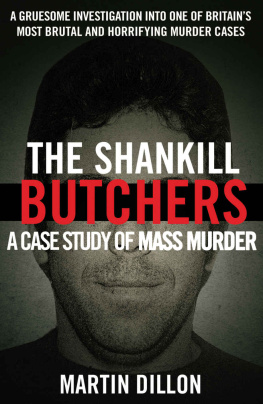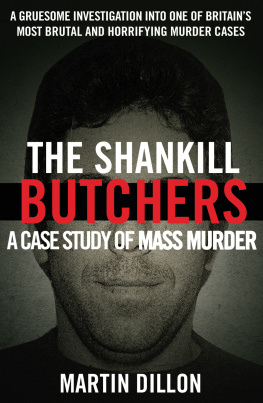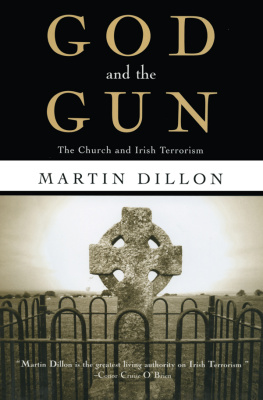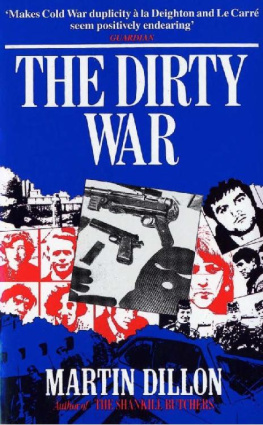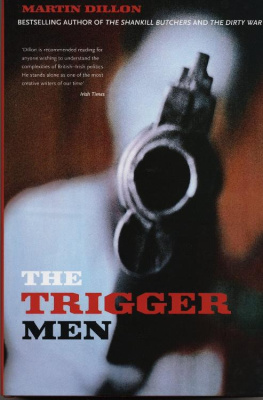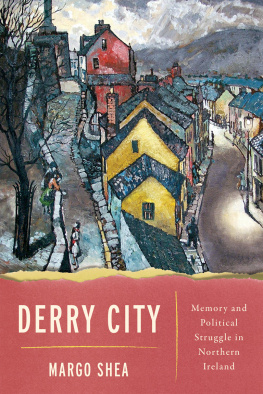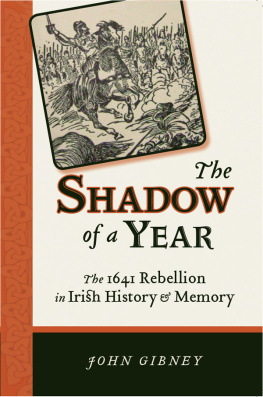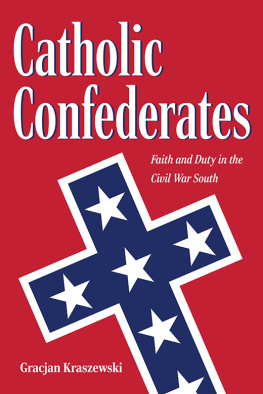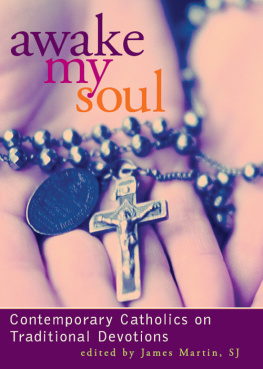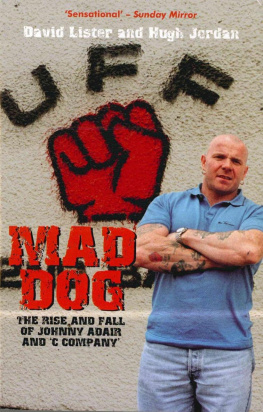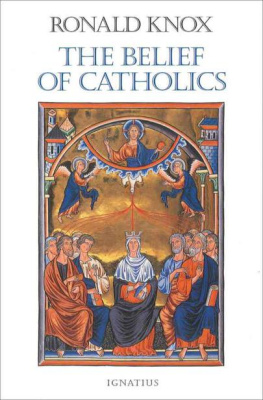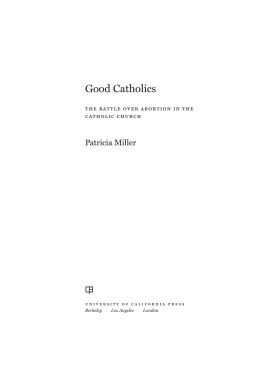Contents
About the Book
This was the ultimate way to kill a man
During the 1970s a group of Protestant paramilitaries embarked on a spree of indiscriminate murder which left thirty Northern Irish Catholics dead. Their leader was Lenny Murphy, a fanatical Unionist whose Catholic-sounding surname led to his persecution as a child for which he took revenge on all Catholics.
Not for the squeamish, The Shankill Butchers is a horrifying detailed account of one of the most brutal series of murders in British legal history a phenomenon whose real nature has been obscured by the troubled and violent context from which it sprang.
About the Author
Martin Dillon is a native of Belfast although educated in England. He lived in France for a time and returned to Northern Ireland to work as a journalist with the Irish News before joining the Belfast Telegraph. He has also worked as a freelance journalist for several national newspapers and American periodicals. In 1973 he wrote Political Murder in Northern Ireland (with Denis Lehane) which is regarded as the definitive study of political assassination in Northern Ireland. His second book, Rogue Warrior of the SAS (with Roy Bradford), is a biography of the Second World War hero, Lt. Col. Robert Blair Mayne.
Martin Dillon has written plays for BBC radio and television and has been Editor in Northern Ireland of many of the BBCs programmes in the area of current affairs. The Shankill Butchers is the first in a trilogy of books about Northern and Southern Ireland.
Also by Martin Dillon
Rogue Warrior of the SAS (with Roy Bradford)
Political Murder in Northern Ireland
The Dirty War
Killer in Clowntown: Joe Doherty, the IRA
and the Special Relationship
Stone Cold
The Serpents Tail
God and the Gun: The Church and
Irish Terrorism
The Assasination of Robert Maxwell:
Israels Superspy
The Enemy Within
The Trigger Men
Crossing The Line
THE SHANKILL BUTCHERS
A Case Study of Mass Murder
Martin Dillon

To all victims of violence
in Northern Ireland
Murder is negative creation.
Every murderer is the rebel
who claims the right to be omnipotent.
His pathos is his refusal to suffer.
W. H. Auden, The Dyers Hand
List of Illustrations
Hugh Leonard Thompson Murphy, leader of the Shankill Butcher gang
Moore and Bates, men who were prominent in Murphys reign of terror
Edwards and Townsley
Waugh and Bell
McClay and McIlwaine
Big Sam McAllister
James Tonto Watt
The Windsor Bar on Belfasts Shankill Road
A bullet-riddled lorry
Archibald Hanna
Knife marks on the hands of Gerard McLaverty
Funeral of a part-time UDR Sgt
The car in which Lenny Murphy met his death
The mass murderers headstone
Jimmy Nesbitt with Det. Sgt Cecil Chambers
Det Inspector John Fitzsimmons
Nesbitt at Buckingham Palace to receive the MBE
Acknowledgements
Many people provided help and assistance to me while I was writing this book. Foremost among them was Stephen Dillon who helped with some aspects of the research and possessed a genuine appreciation of the story. Bill McGookin of the Royal Ulster Constabulary Press Office made it possible for me from the outset to gain access to police files and to those men in the Force who were frontline detectives and relevant to the story. I must pay tribute to all the policemen who spoke with me. They all demonstrated integrity. The person within the RUC to whom I owe the greatest debt is Superintendent Jimmy Nesbitt who was unceasing in his efforts to unearth material I required, who constantly sought out detectives who were central to the story and who at all times was honest and frank with me. There were also detectives such as Jim Fitzsimmons, Cecil Chambers, John Scott and Roy Turner who provided me with invaluable insights.
One man who encouraged my writing of this book was Jim Campbell, northern editor of the Sunday World newspaper who survived an attempt on his life while he was trying to expose this story in the early eighties.
Others who deserve to be mentioned are: Chris Ryder of the Daily Telegraph, David McKittrick of the Independent, Jim Cusack of the Irish Times, David Ross, a senior producer at the BBC, and freelance journalist, Ivan McMichael.
I also owe much to my wife, Kathy, who lived with the evidence of the horror of this story.
The former Nationalist politician, Paddy Devlin, who is now a writer and broadcaster, provided me with interesting perspectives of the Northern Ireland conflict as did the writer and broadcaster, Andrew Body, who encouraged me to examine the important writing of Father McGriel SJ.
Unfortunately there are those whom I would not name because in doing so I would place their lives in jeopardy. They are members of the legal profession, policemen who work undercover and former members of paramilitary associations. To all those I owe a debt of gratitude for their trust and the revealing manner in which they responded to my questions.
Pacemaker Press in Belfast assisted with my photographic requirements and the Belfast Telegraph kindly provided relevant photographs from its archives.
Finally, I must thank the criminologist, John Bach, for assisting me in an understanding of the criminal law in Northern Ireland and the BBC librarian, Adele Gilding, for seeking out historical works relevant to my study.
Foreword
The particular atrocities which are horrifyingly documented by Martin Dillon in this book were legitimized in the name of God and Ulster. Other atrocities are legitimized in the name of God and Ireland (or simply Ireland, with God vaguely present). Both kinds of atrocities continue in 1989 in a sinister pattern of sectarian and political tit for tat.
That is the general picture, but it needs more qualification. The Shankill Butchers remain unique in the sadistic ferocity of their modus operandi. The Provisional IRA by far the most important of the various murderous organizations of Northern Ireland never unleashed on society anyone quite like Lennie Murphy, the chief of the Shankill Butchers.
At the time of these ghastly random murders of innocent Catholics by Protestant sadists, Catholics found a crumb of comfort in the thought of their own moral superiority. Our own murderers might murder more people in the course of time, but at least they didnt do such horrible things to them before they died, and while they were dying. Catholics were confirmed in their traditional belief that Protestants have a dose of Original Sin.
I dont find the theological explanation convincing, but I remain puzzled both by the phenomenon of the Butchers, and the absence of an exact parallel among the Catholic murderers. Lack of centralized authority on the Protestant side and the relatively tight hierarchical structure of the Irish Republican Army may partly account for the difference. The rest of the difference may be accounted for by the fact that the IRA is much more interested in its public image than the Protestant paramilitaries have been in theirs. The IRA has had its quota of psychopaths, but it has been on its guard against them, most of the time, if only because of the image problem; and it has been better able to control them, because of its tighter discipline. In any case, anyone who may imagine that there is no Butchers

